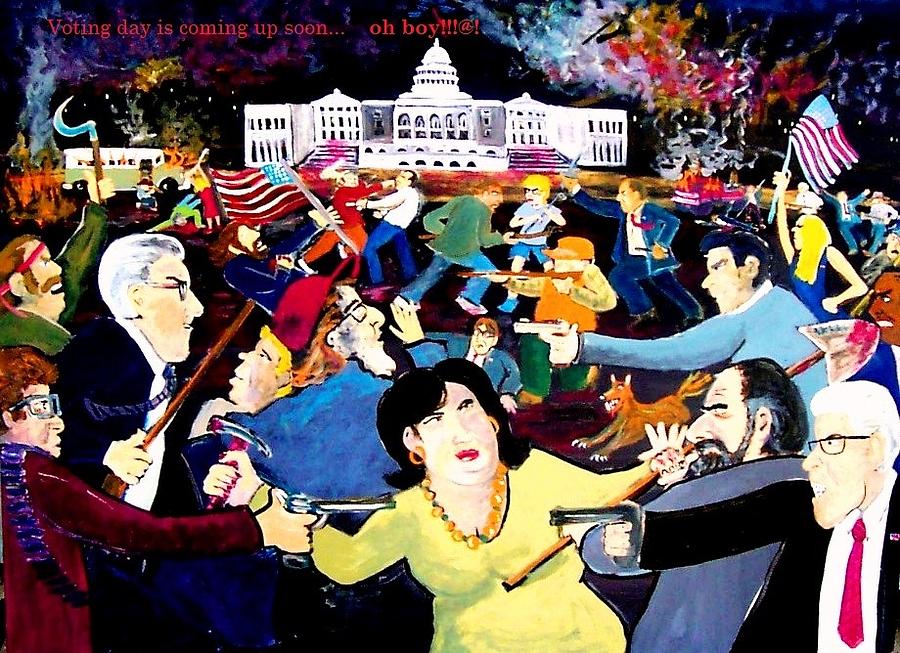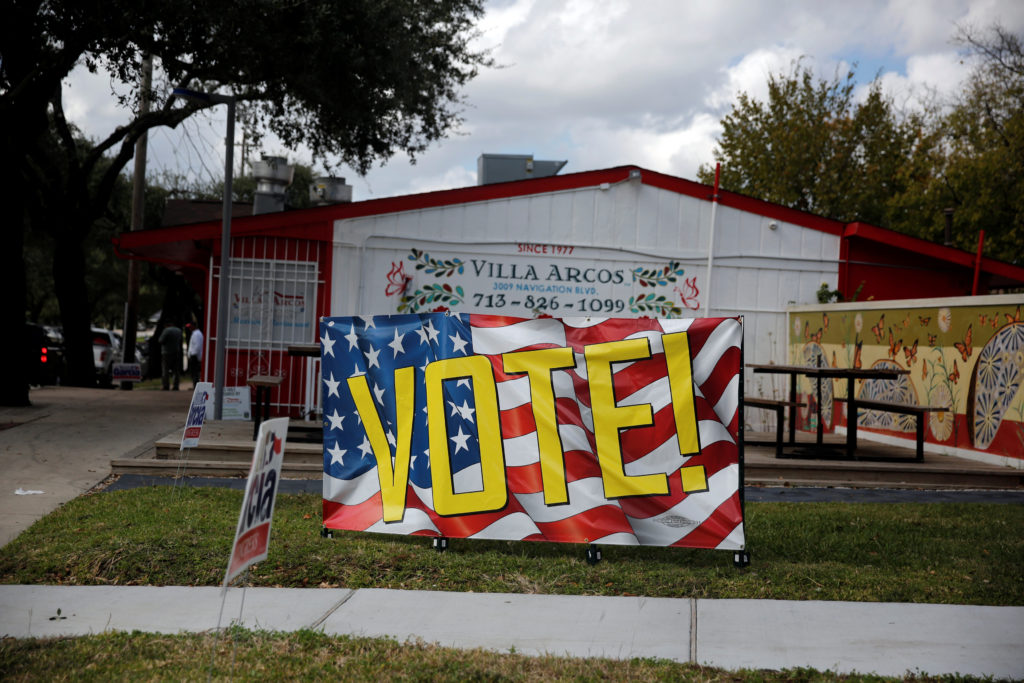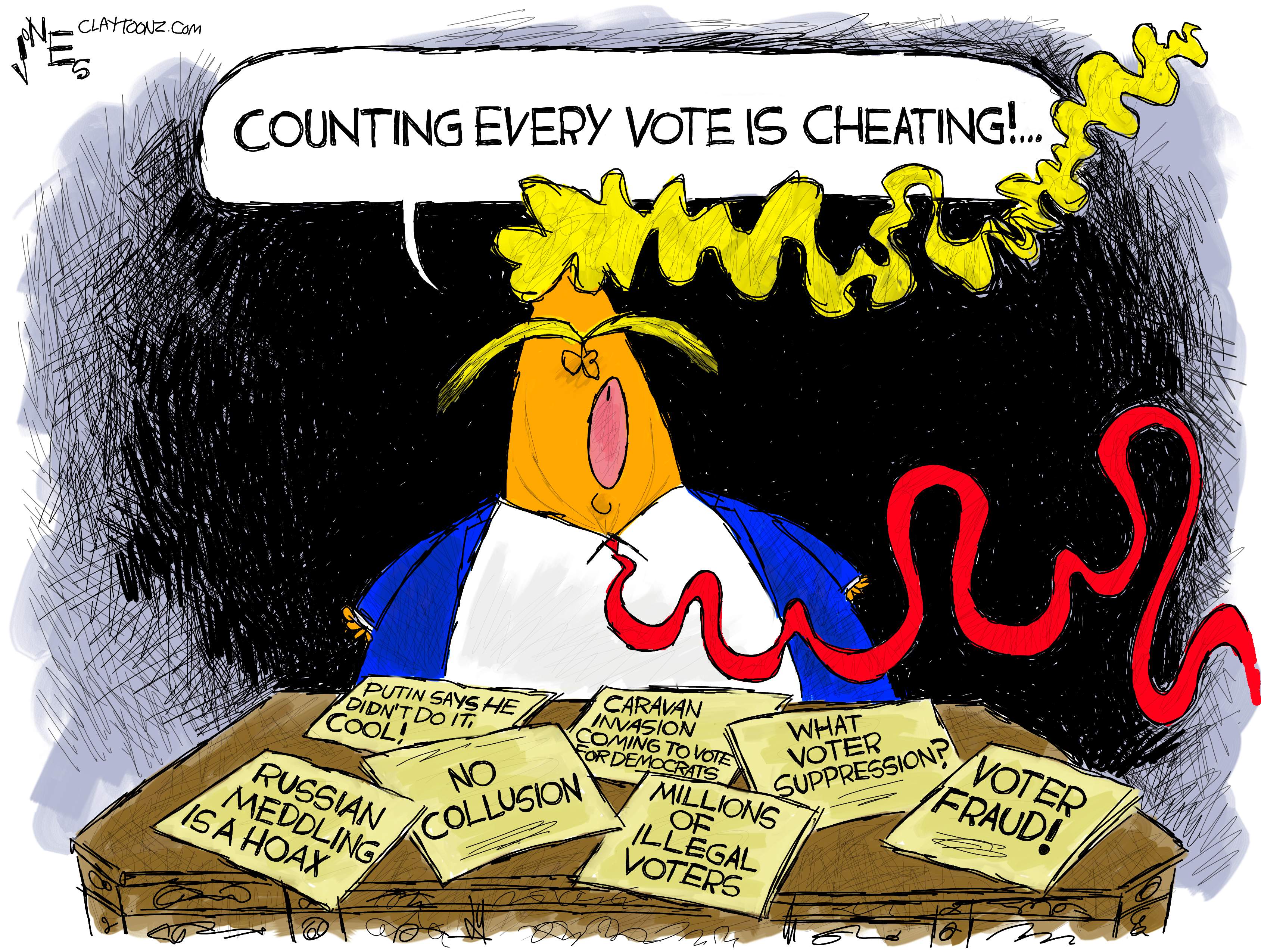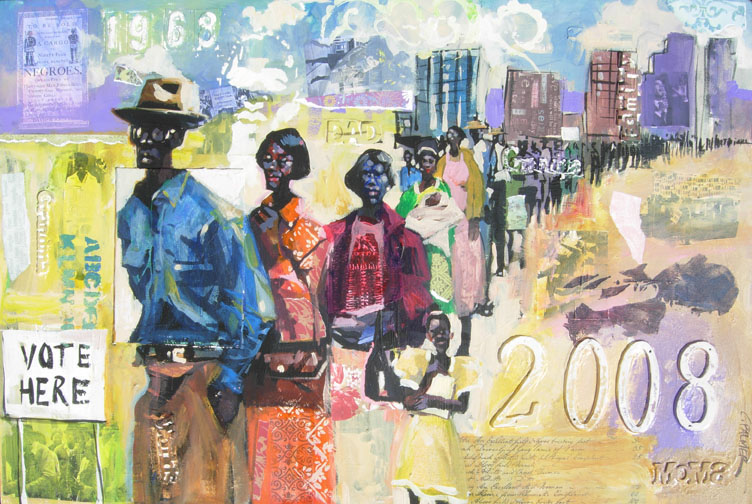Tuesday Reads: SCOTUS and the Upcoming Election
Posted: October 27, 2020 | Author: bostonboomer | Filed under: 2020 Elections, Afternoon Reads, U.S. Politics | Tags: Amy Coney Barrett, Bush v. Gore, Donald Trump, SCOTUS, U.S. Supreme Court |14 CommentsGood Afternoon!!

Voting Day Coming Up Soon Oh Boy Painting by Richard Hubal
Election day is one week away. I haven’t slept normally since the pandemic began, and–along with millions of other Americans–I’ve been stressed out since Trump was elected. It’s exhausting. I honestly don’t think I can survive another four years of this insanity. The polls are looking good for Biden; but as of yesterday we now have to worry about the possibility that the Supreme Court could overturn the election results if Trump loses.
Mark Joseph Stern at Slate: Amy Coney Barrett’s First Votes Could Throw the Election to Trump.
Although George W. Bush prevailed in the Bush v. Gore decision, it’s often forgotten that the Supreme Court declined to affirm his chief legal argument. This claim was so radical, so contrary to basic principles of democracy and federalism, that two conservative justices stepped back from the brink. Instead, the majority fabricated a novel theory to hand Bush the election—then instructed lower courts never to rely on it again.
But the court has changed. Republican lawmakers revived the original Bush v. Gore argument in fraught election cases this year, and, following Amy Coney Barrett’s nomination, four sitting justices appeared to endorse it. Barrett’s confirmation on Monday will almost certainly tip the balance to make that argument the law of the land on the eve of an election. The result would be an immediate invalidation of thousands of disproportionately Democratic ballots in Pennsylvania and North Carolina—two swing states that could decide the outcome of the election. Put simply, Barrett’s first actions on the court could hand Donald Trump an unearned second term, and dramatically curtail states’ ability to protect the right to vote….
In an unsigned opinion that allegedly spoke for the five conservative justices, the court held that Florida’s recount used procedures that violated “the equal dignity owed to each voter.” Because the standards used to recount ballots varied between counties, the court concluded, the process violated the U.S. Constitution’s equal protection clause. Then, in an unprecedented move, the court declared that this analysis was a ticket good for one ride only, and that lower courts should never invoke its made-up principle again.
The reason the Court said this argument shouldn’t be used again is that is took away a state’s ability to control it’s own elections. If repeated, the argument would turn the SCOTUS into a national arbiter of election laws.
It is black letter law that state courts hold ultimate authority to determine the meaning of their own state’s statutes and constitution. And the Florida Supreme Court had simply provided its best interpretation of a “legal vote” under Florida law. Secretary of State Katherine Harris rejected ballots with “hanging chads” on which voters had indicated their preference but failed to punch through the hole all the way. The Florida Supreme Court disagreed, citing a state statute that required the counting of defective ballots “if there is a clear indication of the intent of the voter.” Federal judges had a constitutional obligation to accept that (eminently plausible) reading of the law. By refusing to do so, Rehnquist, along with Scalia and Thomas, impermissibly substituted the Florida Supreme Court’s judgment with their own.
But now Republicans are again trying to get the Court to rule on individual states’ election policies, and yesterday they intervened in Wisconsin’s election decisions. The New York Times: Supreme Court Won’t Extend Wisconsin’s Deadline for Mailed Ballots.
The Supreme Court refused on Monday to revive a trial court ruling that would have extended Wisconsin’s deadline for receiving absentee ballots to six days after the election.
2008 voting line, by Charly Palmer
The vote was 5 to 3, with the court’s more conservative justices in the majority. As is typical, the court’s brief, unsigned order gave no reasons. But several justices filed concurring and dissenting opinions that spanned 35 pages and revealed a stark divide in their understanding of the role of the courts in protecting the right to vote during a pandemic.
The ruling was considered a victory for Republicans in a crucial swing state, which polls have shown Mr. Trump trailing in after winning by about 23,000 votes in 2016.
Returning to the Slate article:
By confirming Barrett on Monday, Senate Republicans may well create a five-justice majority that is ready, willing, and able to make Rehnquist’s position the law of the land. There are currently two cases pending before SCOTUS that ask the justices to nullify thousands of mail ballots in Pennsylvania and North Carolina. Both rest on Rehnquist’s Bush v. Gore concurrence. Both give the far-right majority a chance to stomp on states’ ability to protect voting rights.
I urge you to go read the whole piece at Slate. Right now, Massachusetts rules allow votes to be counted if they arrive 6 days after the election and are postmarked by November 3. Will the SCOTUS decision in Wisconsin also force Massachusetts and other states to throw out ballots received after election day?

A 2918 banner urging people to vote in the midterm elections displayed in Houston, Texas. REUTERS/Cathal McNaughton
Ian Millhiser at Vox: The radical implications of the Supreme Court’s new ruling on Wisconsin mail-in ballots.
The Supreme Court just handed down an order in Democratic National Committee v. Wisconsin State Legislaturedetermining that a lower federal court should not have extended the deadline for Wisconsin voters to cast ballots by mail.
The ruling, which was decided by a 5-3 vote along party lines, is not especially surprising. The lower court determined that an extension was necessary to ensure that voters could cast their ballot during a pandemic, but the Court has repeatedly emphasized that federal courts should defer to state officials’ decisions about how to adapt to the pandemic. Monday night’s order in Democratic National Committee is consistent with those prior decisions urging deference.
What is surprising, however, is two concurring opinions by Justices Neil Gorsuch and Brett Kavanaugh, each of which takes aim at one of the most foundational principles of American constitutional law: the rule that the Supreme Court of the United States has the final word on questions of federal law but the highest court in each state has the final word on questions of state law.
This division of power is implicit in our very system of government. As the Supreme Court has explained, the states and the federal government coexist in a system of “dual sovereignty.” Both the federal government and the states have an independent power to make their own law, to enforce it, and to decide how their own law shall apply to individual cases.
If the Supreme Court of the United States had the power to overrule a state supreme court on a question of state law, this entire system of dual sovereignty would break down. It would mean that all state law would ultimately be subservient to the will of nine federal judges.
 With Barrett on the Court,
With Barrett on the Court,
last week’s decision allowing a Pennsylvania Supreme Court decision to stand could be very short-lived. That decision, after all, was 4-4, with Chief Justice John Roberts voting with the Court’s three liberals. With Barrett, the Court’s right flank may well be getting a fifth vote to toss out the state supreme court’s decision — and to order an unknown number of ballots tossed out in the process.
In her first few weeks at SCOTUS, Barrett will also have the opportunity to vote on cases involving the Affordable Care Act, Trump’s taxes, abortion, and a case about whether a Catholic agency can refuse to place foster children with LGBT couples.
The only recourse for Democrats in the future may be to increase the size of the Supreme Court–if they can take the Senate, that is.
At The Los Angeles Times, Nicholas Goldberg sees a possible silver lining in the Barrett confirmation:
So now it is official: The same Republican senators who in 2016 refused to consider Merrick Garland’s appointment to the Supreme Court because, with eight months to go, it was supposedly too close to the presidential election, have now confirmed Amy Coney Barrett with just eight days left before the election.
This is so unprincipled, so inconsistent and so cynical that it defies the imagination. It is the flip-flop of the century, undertaken by the Republicans for one reason: Barrett’s confirmation ensures a conservative majority on the high court for the foreseeable future.
But here is one good thing that could come of this shameful episode. With millions of people still casting their votes before Nov. 3, perhaps the Barrett confirmation will open Americans’ eyes, once and for all, and show them who they’re dealing with. Perhaps it will persuade them to reject the radical and hypocritical Senate Republicans at the polls.
Barrett’s confirmation, after all, is only one of many irresponsible moves by the Senate majority, led by the craven Mitch McConnell (R-Kentucky), who long ago threw his lot in with President Trump. In recent years, he and his caucus have grown not just more extreme in their ideology but more unscrupulous in their tactics.
Not only did they refuse a hearing to Garland (giving that seat instead to Trump appointee Neil M. Gorsuch), but not long after, McConnell and his colleagues rammed Brett Kavanaugh’s nomination through without a comprehensive investigation of the sexual assault allegations against him.

Voting Line, by Charly Palmer
Maybe. It seems unlikely that many votes are going to change at this late date, but I hope Goldberg is right. On the other hand, it’s possible the evidence that the pandemic is getting worse might influence some voters to reject Trump and other Republicans.
One more from The New York Times Editorial Board: The Republican Party’s Supreme Court. The quest to entrench political conservatism in the country’s highest court comes with a steep cost.
What happened in the Senate chamber on Monday evening was, on its face, the playing out of a normal, well-established process of the American constitutional order: the confirmation of a president’s nominee to the Supreme Court.
But Senate Republicans, who represent a minority of the American people, are straining the legitimacy of the court by installing a deeply conservative jurist, Amy Coney Barrett, to a lifetime seat just days before an election that polls suggest could deal their party a major defeat.
As with President Trump’s two earlier nominees to the court, Neil Gorsuch and Brett Kavanaugh, the details of Judge Barrett’s jurisprudence were less important than the fact that she had been anointed by the conservative activists at the Federalist Society. Along with hundreds of new lower-court judges installed in vacancies that Republicans refused to fill when Barack Obama was president, these three Supreme Court choices were part of the project to turn the courts from a counter-majoritarian shield that protects the rights of minorities to an anti-democratic sword to wield against popular progressive legislation like the Affordable Care Act.
The process also smacked of unseemly hypocrisy. Republicans raced to install Judge Barrett barely one week before a national election, in defiance of a principle they loudly insisted upon four years ago.
I hope you’ll read the whole thing, but here’s a bit more:
Of all the threats posed by the Roberts Court, its open scorn for voting rights may be the biggest. In 2013, Chief Justice John Roberts wrote the lead opinion in the most destructive anti-voter case in decades, Shelby County v. Holder, which gutted the central provision of the Voting Rights Act and opened the door to rampant voter suppression, most of it targeted at Democratic voters. Yet this month, Chief Justice Roberts sided with the court’s remaining three liberals to allow a fuller count of absentee ballots in Pennsylvania. The four other conservatives voted against that count. In other words, with Justice Barrett’s confirmation the court now has five justices who are more conservative on voting rights than the man who nearly obliterated the Voting Rights Act less than a decade ago.
I hope I haven’t ruined your day with this post, but the Barrett confirmation is clearly the most important issue of the day. I can only hope that the outcome of next week’s election will be a landslide that prevents SCOTUS from overturning the results.
Please take care today and protect your health and sanity over the next week. I hope you’ll stop by and leave a comment or two.
Did you like this post? Please share it with your friends:
- Share on Facebook (Opens in new window) Facebook
- Share on Reddit (Opens in new window) Reddit
- Share on Pinterest (Opens in new window) Pinterest
- Share on Tumblr (Opens in new window) Tumblr
- Share on Mastodon (Opens in new window) Mastodon
- Share on LinkedIn (Opens in new window) LinkedIn
- Email a link to a friend (Opens in new window) Email
- Print (Opens in new window) Print
- Share on X (Opens in new window) X
- Share on Threads (Opens in new window) Threads
- Share on Bluesky (Opens in new window) Bluesky
- More






At The Atlantic, Caroline Mimbs Nyce lists suggestions for How to Not Go Crazy the Week Before an Election.
Click the link to read the suggestions.
Well, last night I was in full panic mode with the shenanigans that went on yesterday. I decided to take a very deep breath and try to envision what I would do if the unthinkable happens. Long story short, I’d try to buy some getaway place on a lake and get a dog and meditate with a picturesque view. I’m old so it wouldn’t be impossible. Oh,and try not to get Covid.
In the more immediate future, maybe I have to take up praying and contemplate inspirational material. Not my usual plan but maybe prayers are what’s needed.
I think we’ve got a better chance now than in 2016, because 1) more people are voting and 2) the POTUS candidate is male. OTOH, the Republican chicanery is worse and no doubt so is the Russian hacking.
Thanks for posting the article on how not to crazy before the election! Much needed.
The entire Republican party has to pay for this travesty. I really hope the voting lines tell a huge story that comes true.
I think it may help with a few suburban voters but frankly, the Trumpies are such a death cult that I doubt most of them are even reachable.
I don’t think anyone believes that Trump fans can be convinced. The goal is to get sane people out to vote.
That figures. Trump is so weak and whiny that his fans have to threaten anyone who stands up to him with violence.
Not only is that statement despicable and insulting to the highest degree, but within the same speech, he said that three weeks in, when Joe is shot, Kamala will be stepping in. I did not hear the context, but what a chilling thing to say.
I am as paralyzed with angst as everyone else, so a good belly laugh is definitely welcome …
https://www.thestar.com/entertainment/2020/10/27/50-cents-un-endorsement-of-donald-trump-is-a-rap-joe-biden-must-love.html